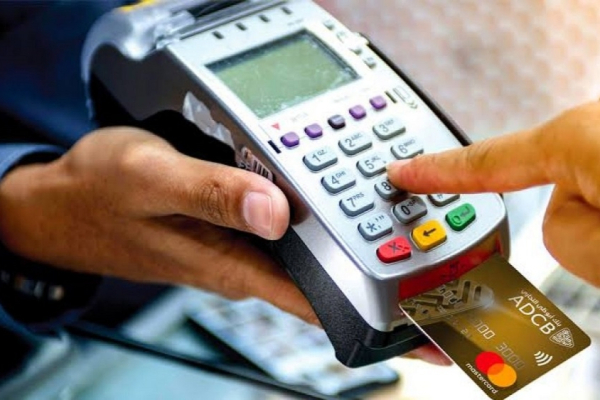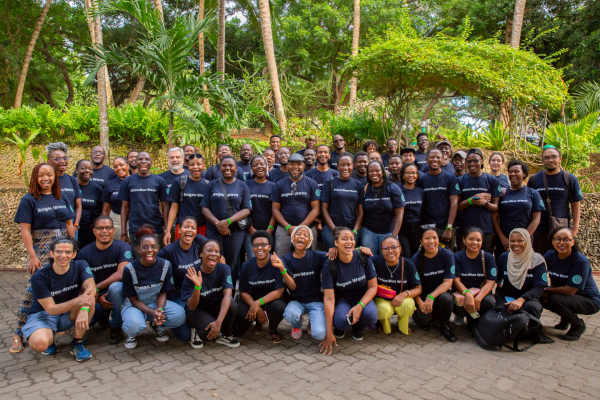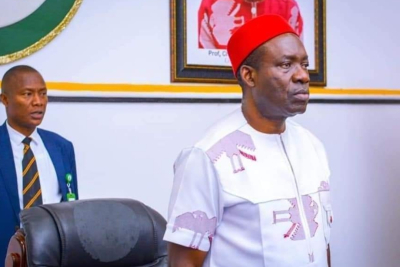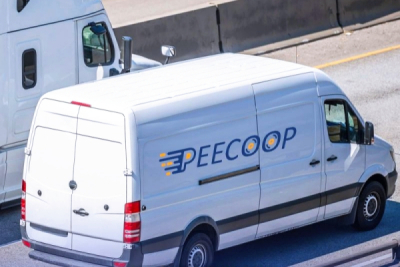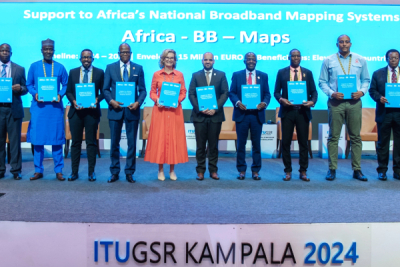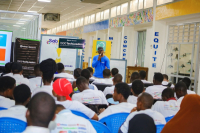Accelerex, a leading African fintech company, has launched the “Pay with Fingerprint” solution, Nigeria's first biometric-enabled PoS payment system.
Designed to address card fraud and eliminate the need for physical cards, the technology allows bank account holders to make secure payments using their fingerprints at merchant locations.
BFA Global, FSD Africa, and the International Union for Conservation of Nature (IUCN) have chosen ten startups for the Africa Blue Wave and Regen Wave initiatives, BFA Global announced on July 1.
Selected startups, each receiving $55,000 in funding, span Kenya, Madagascar, Mozambique, Nigeria, Rwanda, South Africa, and Tanzania, addressing challenges like the fish trade, environmental pollution, renewable energy certification, eco-friendly fertilizers, waste management, clean cooking, cold storage, and sustainable drainage solutions.
Enhancing internet connectivity promotes digital inclusion across regions, ensuring more people have access to online resources, education, and opportunities. This aligns with broader efforts in Africa to bridge the digital divide and empower communities through technology.
Governor Chukwuma Soludo announced, on July 2, a 2,400km fibre optic network initiative to provide free Wi-Fi across Anambra State. Revealed during the swearing-in of the 2024 Batch ‘B’ Stream 1 NYSC members, the project aims to address internet connectivity challenges.
Soludo, represented by Martin Agbili, Permanent Secretary of the Ministry of Youth Development, emphasized youth empowerment and local enterprise support. He said, “My administration has articulated a deep-rooted policy towards the youths which corps members deployed to the state benefit.”
Nigeria, with its large population (accounting for 47% of West Africa’s total), a significant youth demographic (half of its 200 million people are under 30), and a robust mobile market, has immense potential in the digital economy. However, limited fixed broadband infrastructure in rural areas leaves many marginalized segments without Internet access. Strategic investments are crucial to fully unlock the country’s digital economic opportunities and transform lives, as highlighted by the World Bank assessment and Nigeria’s Economic Recovery and Growth Plan 2017–2020.
The network aims to boost digital infrastructure and economic opportunities in Anambra. It aligns with the ‘Everything Technology and Technology Everywhere’ vision of the state's governor.
Hikmatu Bilali
Fueled by a frustrating sofa delivery experience, Redouane El Halaoui partnered with someone to develop a solution. This solution incorporates a negotiation feature to benefit both consumers and providers.
PeeCoop, a delivery solution developed by the Moroccan company Red Ant, enables users to have packages and goods delivered across multiple cities in Morocco. Launched in 2020 by Redouane El Haloui and Antoine de Mirbeck, this Casablanca-based startup offers a mobile application available on both iOS and Android, which has already been downloaded over 10,000 times from the PlayStore.
After downloading the app, users create an account according to their status. PeeCoop provides account options for individuals, independent transporters, and e-commerce platforms. Regardless of the account type, users must enter their phone number and follow the registration process.
For individuals looking to have a package delivered, the process is straightforward. After creating an account, users submit a delivery request by uploading a photo of the package and filling out a form. This form includes a description of the merchandise, its dimensions, weight, pickup date, time, and location, and a proposed price. Once the request is submitted, multiple transporters receive it and those interested in the job contact the client. This initiates the negotiation, allowing both parties to reach an agreement.
Speaking about the price negotiation feature, Redouane El Haloui stated in a 2021 interview on the Medi-Up podcast: "We wanted to give drivers the option to propose a price. It's simpler, and they know their colleagues will also be proposing prices, so it happens naturally. They can offer the right prices for the client, who then has the option to accept or negotiate."
PeeCoop currently boasts over 2,000 "peecoopers" across Morocco and more than 18,000 satisfied customers. The startup claims its service helps clients save up to 75% on delivery costs.
Adoni Conrad Quenum
With less than a third of Africans having access to high-speed internet, broadband adoption remains uneven, with connectivity often being either costly or unreliable across the continent. However, initiatives are underway to address this disparity.
On Thursday, July 4, the International Telecommunication Union (ITU) announced the launch of the Africa Broadband Maps project in a statement made during the 2024 Global Symposium for Regulators in Kampala, Uganda. This broadband mapping initiative, supported by the European Commission, aims to establish mapping systems to encourage investment and digital transformation across Africa. With a budget of €15 million over four years, the project will initially benefit 11 countries: Benin, Botswana, Burundi, Côte d'Ivoire, Ethiopia, Kenya, Malawi, Nigeria, Uganda, Zambia, and Zimbabwe.
The initiative, led by the ITU's Telecommunication Development Bureau (ITU BDT), aligns with the organization's efforts to improve digital connectivity on a continent where internet access remains limited in many regions.
According to the "Connecting Africa through Broadband" report published by the Broadband Commission in 2019, an estimated $100 billion needs to be invested over ten years to provide comprehensive broadband coverage across Africa. About 80% of this amount is earmarked for the deployment and maintenance of networks, 17.5% for developing local digital skills, and approximately 2% for creating an appropriate regulatory framework.
The Africa Broadband Maps project aims to identify areas with insufficient broadband coverage or substandard internet speeds. The findings will enable policymakers to allocate resources efficiently, ensuring that investments in infrastructure expansion are both effective and equitable. This initiative is expected to play a crucial role in closing the digital divide and fostering economic growth, education, and innovation across the continent.
Samira Njoya
She has extensive experience in digital technology and the development of online loyalty programs. Her company enables consumers to consolidate their loyalty points on a single platform, making them easier to use.
Moroccan engineer and entrepreneur Siham Elmejjad (photo) is the co-founder and CEO of Tookeez, a startup inspired by her passion for digital, economic, and financial inclusion.
Tookeez was founded in 2020 by Siham, her sister Wiam Elmejjad, and Hicham Amadi. The startup offers a platform that allows consumers to convert their rewards into tangible benefits. Users can consolidate their loyalty points from various retailers into a single digital wallet, which they can then exchange for services or discounts.
Tookeez also helps businesses understand their customers better by providing consumer behavior analytics and targeted marketing campaigns. In March 2024, the startup raised $1.5 million from Azur Innovation Fund, with the goal of reaching 4 million users by 2028 and expanding to a new country by 2026. Currently, the platform has over 20,000 users.
"We plan to enhance the user experience by developing new features and integrating cutting-edge technologies like blockchain and artificial intelligence to optimize interactions between brands and consumers within our system," Mrs Siham Elmejjad said.
The CEO holds an engineering degree in information technology, earned in 2002 from the National Institute of Posts and Telecommunications (INPT). She began her career the same year at Alcatel Research and Innovation as a research and development engineer. In 2004, she became the marketing director at Maroc Telecom.
In 2006, she joined Bilendi, a company that designs and markets online loyalty programs. There, she successively held the positions of business and development manager and general manager in Morocco. In 2019, she became the executive vice president responsible for products and deliveries at World Wide Loyalty System (2WLS), where she worked until 2023. 2WLS helps brands adopt loyalty strategies for their customers and partners.
Melchior Koba
In recent years, the digital sector has become one of the most significant development areas for several African countries with the digital economy improving millions of lives. In that context, a Guinean program aims to qualified local ICT professionals.
1000 TechLeaders is an innovative program in Guinea aimed at developing a new generation of skilled professionals in information and communication technology (ICT). Launched on June 18, 2024, by Nimba Hub and the Devscom developer community, the program is championed by Fodé Momo Bangoura, the CEO of Nimba Solution. The objective is to equip young people with advanced technological skills, stimulate local innovation by creating a network of qualified professionals, and facilitate access to investment for innovative projects.
The program offers four main courses, tailored to the current demands of the tech job market: backend development, frontend development, mobile development, and UX/UI design (user experience and interface design). Each course lasts six months and combines theory with practical training, delivered in person.
For 2024, 1000 TechLeaders has already selected 130 young talents from 754 applicants. The courses began on the program's launch day and will conclude on Sunday, December 8, 2024.
To achieve its ambitious goals, the program is supported by several sponsors and partners, including Medias 7 Plus, AfroTech Hub, Tech Elevate Africa, Fata.school, the restaurant Heroes Coffee, and Guinea's Post and Telecommunications Regulatory Authority (ARPT).
Melchior Koba
African startup funding continues to decline sharply with the first half of 2024 being the quietest semester since late 2020. This represents a significant drop from previous years, with the "Big Four" startup hubs of Nigeria, Kenya, Egypt and South Africa continuing to dominate the funding landscape
African startups raised $780 million in the first half of 2024, a 57% decline compared to the same period in 2023, according to data released on Thursday, July 4, by Africa: The Big Deal, a database tracking investments of over $100,000 in the continent's startup ecosystem.
Of the total funds raised, 66% ($513 million) were in the form of equity, while $254 million (33%) were secured as debt. Startups in the Big Four countries (Kenya, Nigeria, Egypt, and South Africa) accounted for 79% of the total funds raised during this period.
Kenya led with $244 million (32%), followed by Nigeria with $172 million (23%), Egypt with $101 million (13%), and South Africa with $85 million (11%). Among other countries outside the Big Four, Benin stood out with $50 million raised by the startup Spiro through debt from Afreximbank, while Ghana followed with $29 million, Uganda with $19 million, Morocco with $14 million, and Senegal with $11 million.
Transport and logistics startups, driven by Nigeria's Moove ($100 million) and Benin's Spiro ($50 million), led the sectors with $218 million, representing 28% of the total funds raised. Fintech followed with $186 million (24%), and startups in the energy and water sectors rounded out the top three with $132 million (17%)
Adoni Conrad Quenum
The Creative Industries Initiative for Africa (C.I.I.F.A.), in collaboration with Google, announces the launch of the second Engage Nigeria cohort.
Engage Nigeria offers training in music business, production, event planning, cinematography, animation, graphic design, and content creation. Participants benefit from mentorship and networking opportunities to enhance career readiness.
Application is open to individuals aged 17- 35.
Angel Fair Africa, the event linking African entrepreneurs with investors, returns for its eleventh edition on November 7-8, 2024. The gathering will unite accelerators, incubators, businesses, and investors from across the continent, aiming to foster deals and partnerships in the vibrant startup ecosystem.
Launched in September 2013, Angel Fair Africa has been pivotal in catalyzing investment across Africa, having been hosted in cities like Johannesburg, Lagos, Accra, and Cape Town.
More...
With the acceleration of digital transformation, digital skills have become indispensable assets in Africa. To equip the population with these crucial competencies, strategic partnerships are being established.
Orange Mali, a subsidiary of telecom group Orange, has signed a partnership with the United Nations Development Programme (UNDP) to train 3,000 young people, particularly young women, in digital skills over a two-year period. The announcement was made via a press release issued by the UN body on Monday, July 1.
"With great pride and immense satisfaction, we announce the signing of this partnership agreement between UNDP Mali and Orange Mali. [...] Women, while representing an essential force, are underrepresented in the technology sectors," stated Maleye Diop, UNDP Resident Representative in Mali.
He added, "Our goal is to create a coherent vision of youth integration through concrete programs that allow them to become operational quickly. This project is just the first step towards other promising initiatives to come."
In an increasingly digital world, having digital skills has become indispensable. All sectors of activity are moving towards digitalization, and it is urgent to adapt to this new world. The World Bank, in its 2021 report titled "Digital Skills: The Why, the What and the How," emphasized that significant deficits in digital skills on the continent expose the economies of many African countries to the risk of falling further behind as the digital frontier rapidly evolves.
Orange Group, through its strategic plan "Engage 2025," prioritizes the development of digital skills on the continent. The proliferation of Orange Digital Centers in many countries across Africa, including Mali, and the signing of this partnership with UNDP are part of this plan. The pilot phase of the program has already been launched, aiming to train 200 young women in areas such as digital marketing, web development, graphic design, and video editing.
Adoni Conrad Quenum
He plays a key role in the development of ICT in South Africa. Through an innovative platform, he connects technology experts with clients seeking specialized services.
Sai Govender (photo), a South African tech entrepreneur, is the founder and CEO of Blue, a startup he established in 2020. Blue is an innovative platform that simplifies the search for talent and projects in the ICT sector, offering clients a wide range of professionals specializing in various fields such as software development, network infrastructure, cybersecurity, and data analysis. This enables clients to easily find consultants that meet their specific needs.
Blue also provides ICT consultants with opportunities to secure rewarding projects. Consultants can showcase their skills, references, and experiences on their profiles, allowing them to effectively respond to tenders, demonstrate their capabilities, and expand their professional network. This approach facilitates direct interactions between clients and consultants for their ICT needs.
In addition to Blue, Govender is the founder and CEO of Blue Pearl, a start-up he established in 2013. Blue Pearl develops cloud solutions and offers professional consulting services to complement business strategies and management. The start-up implements data analysis processes to provide relevant and useful insights to business leaders for decision-making.
Govender holds a degree in Information Systems Management, obtained in 2002 from Oval International Computer College, and a bachelor's degree in Accounting and Finance from the University of South Africa (UNISA), which he graduated from in 2005.
His professional career began in 1999 at Morar Incorporated, an accounting firm, where he worked as an audit manager. In 2004, he became a compliance auditor for the National Lottery Community Fund. The following year, he joined EY, where he held positions as senior associate, deputy director, and director. In 2010, he was appointed compliance director at Transnet Freight Rail, a logistics and freight transport company in South Africa. In 2015, he was promoted to director, responsible for performance reporting and business intelligence.
Melchior Koba
In Africa, rapid technological progress has delivered numerous benefits, but it has also introduced new threats that jeopardize individuals, businesses, and governments.
The Republic of Congo is taking steps to establish a National Commission for the Protection of Personal Data. The draft bill, presented by Minister of Posts, Telecommunications, and Digital Economy Léon-Juste Ibombo, was approved by the Council of Ministers on Wednesday, July 3.
"Indeed, the protection of personal data has become a major issue in the digital age. With the multiplication of information exchanges on the Internet, it is essential to ensure the confidentiality and security of citizens' personal data," explained Ibombo.
The National Data Protection Commission will be responsible for ensuring that personal data processing does not infringe on citizens' rights and freedoms. It will collaborate with international institutions and other African countries to share best practices and relevant information on cybersecurity threats. The Commission will also raise awareness among citizens and businesses about cybercrime risks and provide training on protective measures.
The creation of this commission is part of the Congolese government's efforts to strengthen current legislation, promote an attractive and secure economic environment, and ensure rigorous control over personal data use. Congo already has a National Information Systems Security Agency (ANSSI) and a law on personal data protection. It has also ratified the Malabo Convention on Cybersecurity and Personal Data Protection.
The Commission's implementation is expected to bolster the fight against cybercrime in Congo and across Africa. According to the 2024 Security Navigator report by Orange Cyberdefense, extortion cases increased by 70% in 2023, resulting in a 10% GDP loss on the continent. This alarming rise underscores the urgency of having an effective regulatory body to protect citizens' and businesses' data.
In recent years, Africa has witnessed the launch of numerous smart city projects aimed at bridging the technology gap affecting the continent.
Brigadier General Bonjean Rodrigue Mbanza, Gabon's Minister of Digital Economy and New Information Technologies, made an official visit to Cameroon on Tuesday, July 2 to explore technologies for a Smart City project in Gabon. The visit aimed to examine existing technologies and draw inspiration to support the development of the project.
According to a statement from the Ministry of Digital Economy, the visit included an inspection of the National Command Center for Video Surveillance and the Data Center in Yaoundé. This visit is part of the Gabonese government's efforts to seek partners and expertise for implementing Smart City projects in several Gabonese municipalities. In April, the minister also visited Shenzhen, China, where he met with Huawei executives and toured the tech giant's advanced infrastructure.
By exploring various technological solutions offered by multiple partners, Gabon aims to select the most suitable one for its needs. Similar to Smart City projects already deployed in several African cities, the Smart City initiative in Gabon aims to address complex urban challenges by creating intelligent urban ecosystems. These ecosystems will focus on areas such as planning, infrastructure, population management, and more.
This ambitious initiative demonstrates Gabon's commitment to integrating cutting-edge technologies into its urban development strategy. The project seeks to improve the quality of life for its citizens and position the country as a regional leader in smart cities.
Samira Njoya


